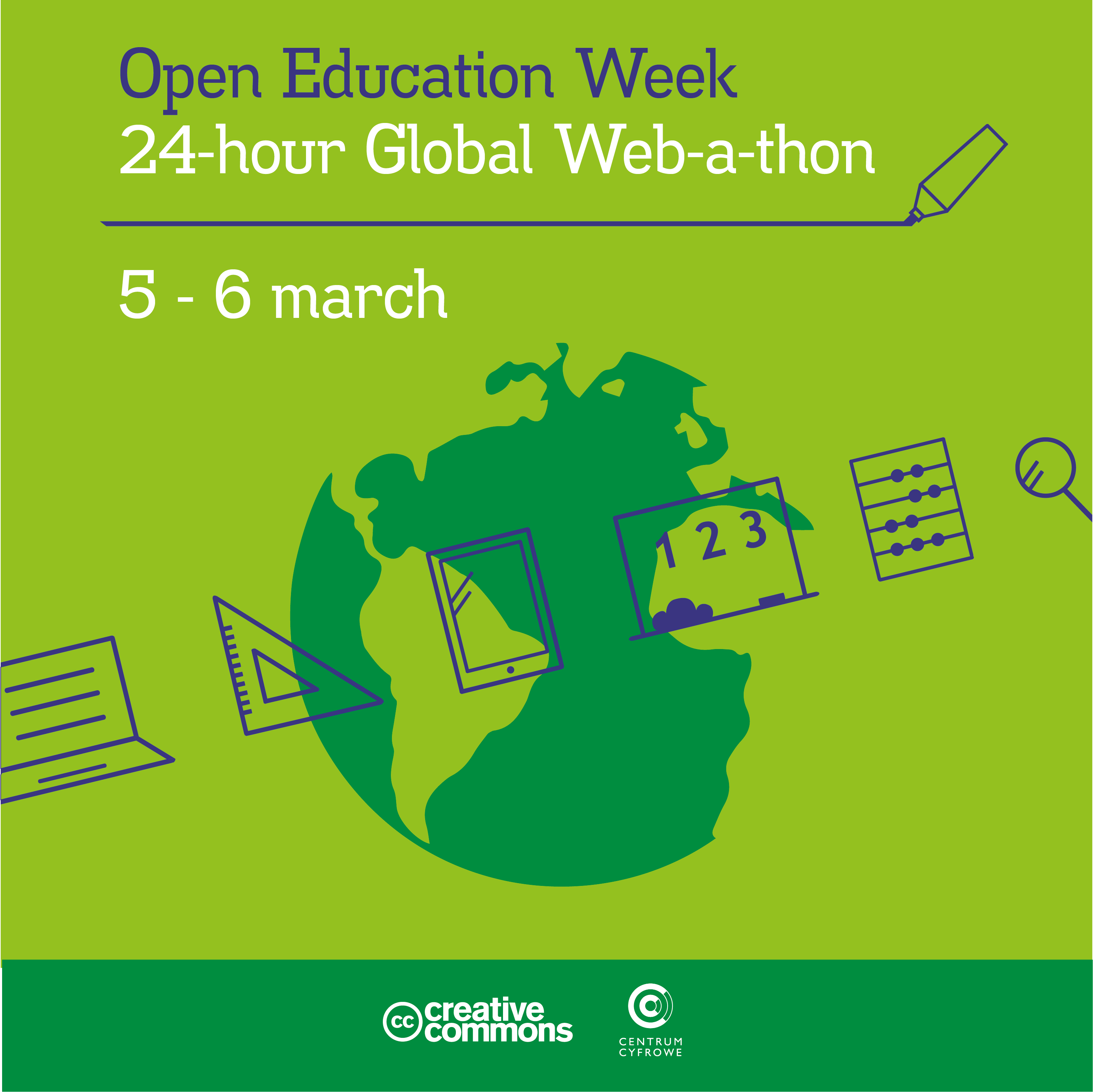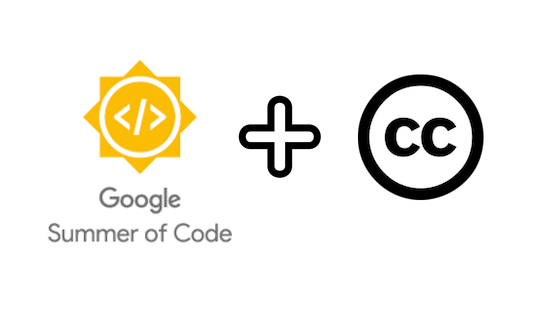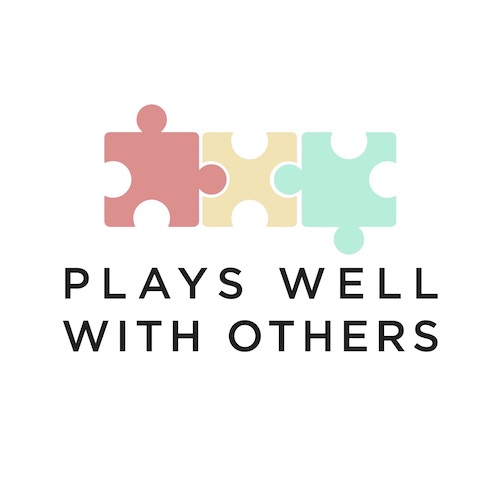
Open Education Week is an annual convening of the global open education movement to share ideas, new open education projects, and to raise awareness about open education and its impact on teaching and learning worldwide. Each year, the Creative Commons global community participates, hosts webinars, gives local talks and shares CC licensed educational resources.
As part of the event this year, the Creative Commons Open Education Platform and CC Poland are hosting a 24-Hour Web-a-thon: 5-6 March (depending on your time zone).
We have amazing speakers from around the world presenting in multiple languages. Experts from Algeria, Nigeria, Argentina, South Africa, Italy, Chile, United Kingdom, Afghanistan, United States, Ireland, Sweden, Canada and Poland will present their open education projects.
Time: All times are UTC (check your local time using worldtimebuddy.com)
Webinar Room: All sessions will be in: https://www.uberconference.com/creativecommons
Day One – March 5
9:00-9:20 – Open Networked Learning – a collaborative open online course on open networked learning
Presentation of the Open Networked Learning course – an initiative from Karolinska Institutet, Lund University, Linnaeus University and Karlstad University with Partner Universities and Organizations in Brazil, Finland, Ireland, Singapore, South Africa, and Switzerland. In particular, we will focus on the new course homepage powered by WordPress and BuddyPress. Jörg Pareigis, Karlstad University
10:00-10:20 – Open Education Initiatives in Francophone North African countries
In this presentation, we will share the state of Open Education initiatives in Francophone North African countries. Kamel Belhamel, University of Bejaia
10:30-10:50 – Open for Educators: Stirring Action via Support Services
Adoption of OER and OEP by educators (K-12 to HEI) strongly depend on support services available. This presentation considers various support services needed by educators to start to shift and implement OER and OEP using a case study of educators in Nigeria. John Okewole, Yaba College of Technology
11:00-11:20 – Open Education to build a Latin American community of information professionals. Fernando Lopez, Aprender 3C
12:00-12:20 – Creating Educational Equity through OER and Open Degree Plans
This presentation will address OER and open degree as a means for reducing the high cost of earning a college degree, providing equity and access to higher education. Carolyn Stevenson, Purdue University Global
12:30-12:50 – Open is an Invitation: Exploring Use of OER with Ontario Post-Secondary Educators
In this short presentation, with lots of time for conversation, I will share the key findings of my doctoral research conducted in partnership with Ontario post-secondary educators in 2018. Jenni Hayman, Cambrian College
13:00-13:20 – Exploring the multiliteracies to support access to OER in South Africa
This presentation explores the specific multiliteracies required within a South African context in order to support epistemological and demiurgic access to OER. This research took the form of a conceptual study with an integrative literature review and document analysis of selected open educational resources and repositories. A broad framework of multiliteracies is presented for use within the Southern African context. Jako Olivier, North-West University
14:00-14:20 – Design process for an open educational resource: a case study
In this presentation we described an experience of creation of an open educational resource following an interactive design methodology, working with design students. The work was carried out within the framework of a university seminar, aimed at introducing students of audiovisual design in technical, legal and design issues and their articulation with pedagogical objectives in an interactive design process. The tasks carried out included the creation of a “user” profile of the target students, analysis of the use situation and the needs of the teachers. The process concluded with the creation of an OER prototype for use in secondary schools. Lila Pagola, Universidad Nacional de Villa María
14:30-14:50 – Open Education Cooperative Educoop
Presentation of the method of co-creation of open educational resources by teachers based on 4 values: cooperation, learning, openness and adventure. I will also show the effects of the first edition of the project. Aleksandra Czetwertyńska, Centrum Cyfrowe
15:00-15:20 – OEGlobal19 call for proposals – tracks and ideas
We are going to briefly present the main topic of next OE Global 19, the main tracks in the call for proposal and give our support to colleagues who might want to ask questions about how to submit their proposals, according to the different formats available this year. Susan Huggins, OE Consortium. Chrissi Nerantzi, University of Birmingham. Paola Corti, Politecnico di Milano.
15:30-15:50 – Open Education in Chile: small steps in an adverse context
Nosotros hablaremos sobre los pequeños pasos y complejos contextos en el donde la educación abierta en Chile, a transitado en los últimos años, con algunas experiencias interesantes y relevantes, ademas del esfuerzo en compromisos concretos a través de los Planes de Acción de Gobierno Abierto. En nuestra opinión, los desafíos presentes y futuros para la educación abierta en el país son enormes, existiendo proyectos e iniciativas importantes, las que esperamos puedan representar nuevos escenarios favorables de mayor equidad y calidad educativa para los estudiantes. Werner Westermann, Biblioteca del Congreso Nacional
16:30-16:50 – OER news from the UK and OER19
We will share news of developments of OER in the UK and the OER19 Conference, taking place in Ireland in April – we will share how you can participate remotely and highlight important new resources and research. Maren Deepwell, Association for Learning Technology
17:00-17:20 – OpenEd in Oklahoma
The purpose of this presentation will be to share the state of Open at Oklahoma State University where we have been, where we are going, and why. Cristina Colquhoun, Clarke Iakovakis, & Kathy Essiller, Oklahoma State University
17:30-17:50 – One adult student’s perspective on open education opportunities
Older than most teachers and administrators, I’m the first online student at Metropolitan State University’s College of Individualized Studies authorized to use my own eportfolio to demonstrate my prior learning for assessment to complete a bachelor’s degree. An EdTech intern, I study open learning technologies and heutagogy. (self-directed learning) Mark Corbett Wilson, Metropolitan State University
18:00-18:20 – A Quick Look at the Future of OER
This talk will look at the impact of new technologies – specifically, open data, cloud technologies, AI and distributed ledgers (blockchain) – on the future shape of OER – what they will look like, how they will be used, and what skills and knowledge will be needed to develop and use the. Stephen Downes, National Research Council Canada
18:30-18:50 – Going beyond the classroom: Digital Humanities OER powered by the European research infrastructure DARIAH
This talk will showcase two types of OER for Digital Humanities that allow for flexibility with different teaching/learning contexts, enable peer learning, and empower teachers and students
to see beyond their institutional perspectives. These are: the Parthenos Standardization Survival Kit and the OpenMethods metablog. Erzsébet Tóth-Czifra
19:00-19:20 – OER Momentum in the Rocky Mountains: Policy, Practice and Purpose
Colorado’s unique leadership with statewide OER efforts is steered by the OER Council, a legislatively created advisory group comprised of representatives from a variety of disciplines and institutional types. This session will highlight how a diverse group of individuals in the Rocky Mountain state have advocated and executed OER efforts at the state level, while also highlighting future ambitions in policy, practice and purpose. Meg Brown-Sica, Colorado State University. Brittany Dudek, Colorado Community College Online. Spencer Ellis, Colorado Department of Higher Education. Jonathan Poritz, Colorado State University-Pueblo.
19:30-19:50 – State of Open Data: Data and Education
This talk will showcase the findings of the chapter about data in education on the book State of Open Data. It aims at presenting the benefits of the use of open data in education, and its value for developing data literacies, but also, it highlights the risks of datafication of education with the aim of giving a wide landspace and perspectives on data in education. Javiera Atenas, ILDA
20:00-20:20 – An OER Library in Afghanistan
OER in Afghanistan? Yes, it’s true! For several years, we have been making and translating OER into Afghan languages, as part of the Darakht-e Danesh (‘knowledge tree’ library). We will tell you about our small but fierce digital library, we will share our lessons learned doing OER in this part of the world, and we will tell you about how we innovate around challenges like insecurity, connectivity and digital literacy. We’ll highlight some of our exciting future plans, and hopefully, leave you inspired. Lauryn Oates, Abdul Parwani, Darakht-e Danesh Library
20:30-20:50 – New open education initiatives in Ireland
Ireland’s ‘National Forum for the Enhancement of Teaching and Learning in Higher Education’ is a unique body, tasked with supporting & fostering T+L enhancement & collaboration across all HEI’s in Ireland. Terry & Catherine will describe national plans in the area of open education – and are open to ideas & feedback. Terry Maguire & Catherine Cronin, National Forum for the Enhancement of Teaching & Learning in Higher Education
21:00-21:20 – Alquimétricos, Open source DIY didactic building blocks
Near past, present and what’s next on building our open tech, didactic content, and branding model. Alquimétricos is a collaborative open project on designing, content developing and DIY (handcraft or digital) fabricating of tech-oriented didactic materials. A word on sustainability on open tangible stuff. Fernando Daguanno, Alquimétricos
21:30-21:50 – OER19 Conference – themes & conversations
Following on from earlier presentation by Maren Deepwell & Martin Hawksey, Catherine (and an OER19 guest, TBC) will explore themes of the upcoming OER19 Conference taking place in Galway, Ireland, April 10-11. The overall conference theme is: ‘Recentering Open: Critical and Global Perspectives’. Catherine Cronin, National Forum for the Enhancement of Teaching & Learning in Higher Education
22:00-22:20 – State of Open Education in Canada
We will share the projects and initiatives happening in Canada around open education. Specifically looking at Provincial initiatives in postsecondary education as well as policies in Open Education in Canada. We will also highlight what is next for Canada, and what we hope to see for the future of Open Education. Amanda Coolidge, BCcampus. Lena Patterson, eCampusOntario.
22:30-22:50 – Creative Commons Certificates
The 10-week CC Certificates course for educators and librarians provides an in-depth study of CC licenses and develops participants’ open licensing proficiency and understanding of the broader context for open advocacy in the Commons. Will also discuss: new CC Certificates in process, facilitator training, translations, and scholarships. Cable Green, Creative Commons
DAY TWO – MARCH 6
7:00-7:20 – Equity-oriented Open Learning in the Marginal Syllabus
A presentation about equity-oriented open learning as supported by the Marginal Syllabus project. The presentation will review design and learning practices summarized in Kalir (2018). Additional information about open learning via the Marginal Syllabus project. Remi Kalir, University of Colorado Denver
10:00-10:20 – Online roundtable on Growing Open Education Policies in 2019
This session is an opportunity for all activist to join and briefly present their organisations and plans for 2019. Host of this session is Centrum Cyfrowe Foundation from Poland – we will present some details about Open Education Policy Forum 2019. Alek Tarkowski, Centrum Cyfrowe Foundation
Be sure to share your Open Education Week activities with: #OEWeek
See you online!
The post Open Education Week: 24-Hour Global CC Network Web-a-thon: 5-6 March appeared first on Creative Commons.

 We are proud to announce that Creative Commons
We are proud to announce that Creative Commons 

